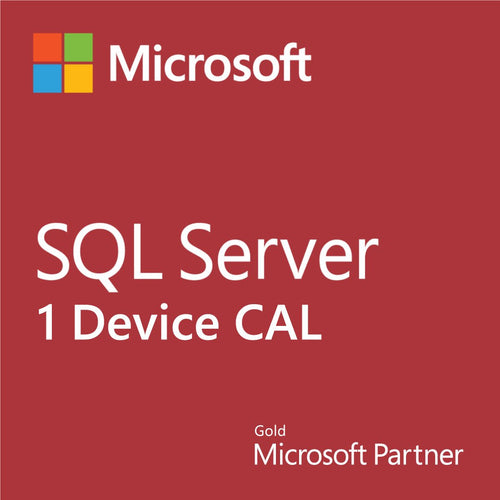
Microsoft SQL Server 2019 - 1 Device CAL
SKU : 359-06865
Details

*This license is for an additional Client Access License (CAL) to be used on an EXISTING SQL server*
Secure Your Data With SQL Server 2019
Query and analyze your data using industry-leading performance and security.
How to License SQL Server Standard
Download the full Microsoft SQL Server 2019 Licensing guide
SQL Server Features: Standard vs. Enterprise
| SQL Server 2019 New Features | Standard | Enterprise | ||
|---|---|---|---|---|
| Compute and storage | Maximum number of cores | 24 | OS Max | |
| Maximum memory utilized per instance | 128 GB | OS Max | ||
| Maximum size | 524 PB | 524 PB | ||
| Intelligence over all your data | SQL Server 2019 Big Data Clusters with Apache Spark and HDFS built into SQL Server engine | |||
| Data virtualization using PolyBase (including additional data sources like Oracle, Teradata, MongoDB, and other SQL Server databases) | ||||
| Unified AI platform to train and operationalize models with SQL Server ML Services | ||||
| Azure Machine Learning and Spark ML | ||||
| Choice of language and platform | Compatibility certfication | |||
| UTF-8 Support | ||||
| Support for SQL Server Java extension | ||||
| Industry-leading performance and availability | Free DR replicas in Azure and on-premises | |||
| Intelligent Query processing: Scalar UDF inlining, table variable deferred compilation, approximate count distinct | ||||
| Intelligent Query processing features: row mode memory grant feedback, batch mode for row store and automatic tuning | ||||
| Automatic read-write connection re-routing | ||||
| In-Memory Database: memory-optimized tempdb | ||||
| In-Memory Database: Persistent Memory support | ||||
| Accelerated Database recovery | ||||
| Support for Kubernetes deployment | ||||
| Secure and reliable | Always Encrypted with secure enclaves | |||
| Transparent database encryption | ||||
| Data classification and auditing | ||||
| Vulnerability assessment | ||||
| Quick business insights | Azure Data Studio to manage SQL Server including support for T-SQL using Notebooks | |||
| SQL Server Analysis Services Direct Query | ||||
Microsoft SQL Server has been one of the premier leaders in database technology for years. The 2019 edition picks up right where its predecessor left off.
Businesses using Microsoft SQL Server 2019 to manage their data are always expanding. If your enterprise is one among them, you may find yourself needing to license an extra device.
New to SQL Licensing? Check out our SQL Server licensing guide to find out the features that would benefit you and how to license. Take a deeper dive into SQL licensing with a licensing expert from our team in our Video Meetup below.
Frequently Asked Questions
Microsoft SQL Server 2019 - 1 Device CAL













